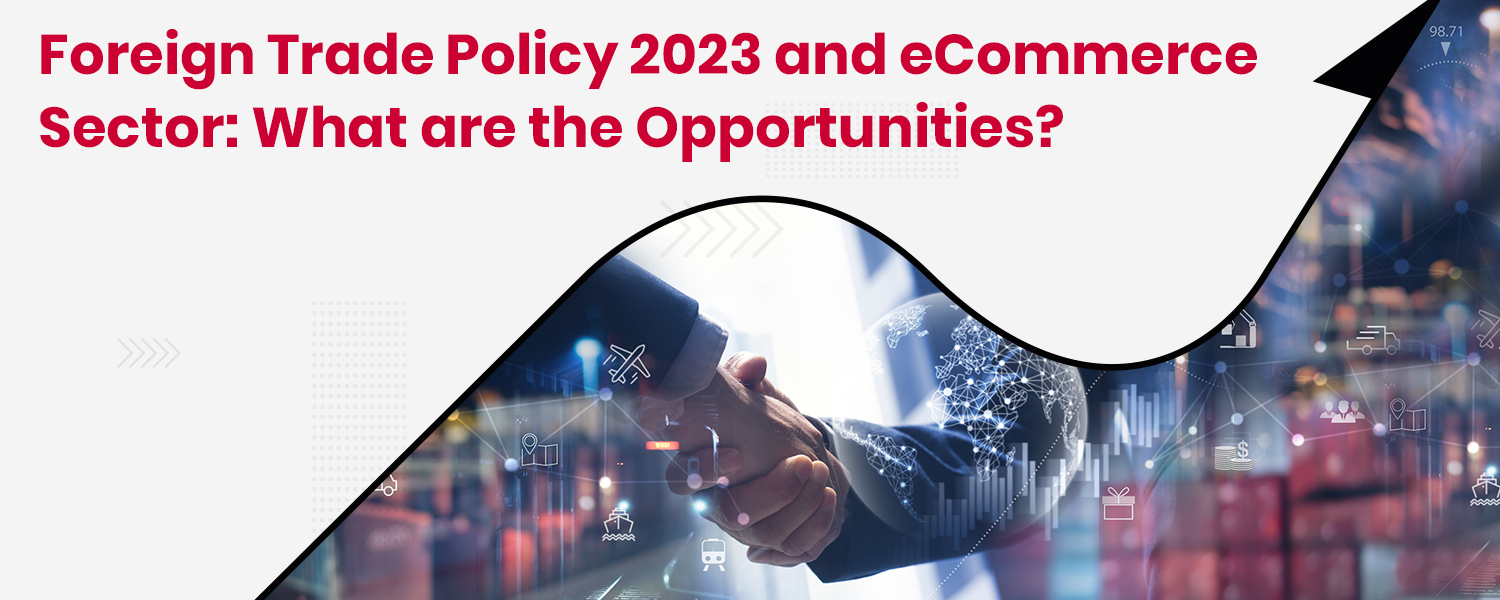Imagine, for a moment, over 633.9 lakh Indian Micro, Small, and Medium Enterprises (MSMEs) thriving in the global markets. As the world watches, India aims to catapult its eCommerce industry onto the global stage, challenging the status quo and redefining the contours of cross-border commerce.
India’s Foreign Trade Policy (FTP) 2023 emerges as a beacon of innovation and strategic foresight. This policy represents India’s audacious vision to intertwine the threads of eCommerce with international trade.
Dive into the depths of FTP 2023 with us as we unravel the intricacies of this landmark policy, exploring its potential to reshape India’s eCommerce landscape.
Understanding the Background of Foreign Trade Policy 2023
The Foreign Trade Policy (FTP) 2023 marks a significant milestone in India’s trade history, showcasing a remarkable evolution from its predecessor, the FTP 2015-2020.
The previous policy, designed for five years, laid the groundwork for export promotion and regulatory streamlining. However, the advent of challenges, including the global pandemic and shifting geopolitical dynamics, necessitated reevaluating and extending the policy framework beyond its initial horizon.
FTP 2023 is imbued with a dynamic nature, distinguishing it from its predecessors. It is a set of directives and living documents poised to adapt and evolve in response to the rapidly changing trade environment.
Central to FTP 2023 is its ambitious goal to propel India towards achieving $1 trillion in merchandise exports and an equal amount in service exports by 2030. It reflects a commitment to harnessing the country’s vast potential, from its rich human capital to its technological prowess, in a push toward greater economic prosperity.
Achieving this goal requires a multi-faceted strategy. FTP 2023 is a critical component, designed to catalyse growth, foster innovation, and encourage the integration of Indian businesses into the global value chain.
Key Pillars of Foreign Trade Policy 2023
1. Incentive to Remission
This initiative introduces a variety of duty remission schemes, such as duty drawback schemes and tax refunds, designed to alleviate the tax burden on exported goods. The objective is to bolster the profitability and global marketability of Indian products by ensuring they remain competitively priced. For exporters, this translates into enhanced profit margins and a stronger position in international markets, making Indian goods more attractive to global buyers and investors.
2. Export Promotion through Collaboration
This pillar encourages a synergistic approach, bringing together exporters, states, districts, and Indian missions abroad to foster a cohesive export promotion ecosystem. Through strategic partnerships and initiatives, this collaborative model aims to broaden market access and deepen India’s integration into the global value chain.
Digitalisation plays a significant role in this endeavor, offering innovative platforms for market exploration, engagement, and the creation of virtual trade corridors that transcend geographical boundaries.
3. Ease of Doing Business
Recognising the critical importance of a streamlined regulatory environment, the “Ease of Doing Business” pillar focuses on eliminating bureaucratic obstacles and simplifying the export process. Measures such as paperless trading, streamlined customs clearances, obtaining import-export code, and single-window clearances are emblematic of this commitment to regulatory reform. These strategic reforms are particularly beneficial for MSMEs, reducing the time, cost, and complexity associated with exporting goods and services.
4. Focus on Emerging Areas
FTP 2023 places a special emphasis on “Emerging Areas,” particularly eCommerce and high-tech exports, recognising their potential to drive future growth. The policy outlines comprehensive support for the development of eCommerce Export Hubs, which are expected to serve as catalysts for eCommerce exports by providing essential infrastructure, regulatory support, and market access. Furthermore, the policy advocates for innovation and the adoption of cutting-edge technologies across various sectors, aiming to position India as a leader in the export of high-value, technologically advanced products and services.
eCommerce Export Initiatives in FTP 2023
Integration with ICEGATE
A cornerstone of FTP 2023 is its integration with the Indian Customs Electronic Gateway (ICEGATE), a move aimed at simplifying export procedures and minimising the administrative burden on exporters. This integration allows for a seamless digital interface where exporters can electronically file all required documents and comply with customs regulations, marking a significant step towards digitising trade documentation.
This technological leap is expected to accelerate the clearance process, mitigate logistical bottlenecks, and enhance the overall efficiency of cross-border eCommerce transactions.
Raising the Consignment Cap
Recognising the challenges faced by small businesses in international trade, FTP 2023 proposes raising the consignment cap for eCommerce exports. This move is designed to allow higher-value consignments to be shipped under simplified procedures, thus enabling small businesses to export larger volumes and higher-value items without being impeded by regulatory hurdles.
Streamlining Regulatory Processes
FTP 2023 places a strong emphasis on streamlining regulatory processes to ease the export journey for eCommerce shipments. This includes the implementation of regulatory reforms such as simplified documentation, compliance requirements, and a digital-first approach to licensing, certifications, and approvals. Such reforms are poised to lower the entry barrier for new and existing MSMEs, encouraging broader participation across sectors and providing a more conducive regulatory environment for innovation and expansion in the eCommerce space.
Encouraging MSME Participation
The policy outlines a series of awareness and support initiatives, including targeted campaigns, educational programs, workshops, seminars, and training sessions designed to inform MSMEs about the opportunities in eCommerce exports and equip them with the necessary skills for success. Furthermore, FTP 2023 introduces financial incentives, subsidies, and technical support services aimed at reducing operational costs and encouraging investment in eCommerce infrastructure.
Opportunities for the eCommerce Industry in FTP 2023
Expanded Market Access
FTP 2023 is a gateway for Indian eCommerce entities to the global stage, encouraging them to explore new international markets and niche segments. Whether it’s artisan goods or cutting-edge tech products, FTP 2023 provides a platform for diverse offerings from India to shine in the global marketplace.
Simplified Export Procedures
A landmark initiative is the integration with ICEGATE, which simplifies the customs and documentation process, reducing the paperwork burden on exporters. This move, coupled with the policy’s emphasis on digital-first procedures, ensures that exporters can manage their operations more efficiently and with fewer bureaucratic hurdles. Such streamlining is a boon for time-sensitive eCommerce transactions, enhancing the ease of doing business across borders.
Enhanced Competitiveness
FTP 2023 recognises the importance of competitive pricing and access in the eCommerce domain. Raising the consignment cap for eCommerce exports allows for higher-value shipments under simplified procedures, enabling businesses to scale their offerings and reach. Additionally, the policy introduces financial incentives, subsidies, and technical support, aimed at reducing operational costs and boosting the competitiveness of Indian eCommerce on the world stage.
Support for MSMEs
The policy focuses on empowering MSMEs through awareness programs, workshops, and training sessions designed to enhance their eCommerce capabilities. Collaborations with eCommerce platforms and logistics service providers are encouraged, providing MSMEs with the networks and partnerships necessary to succeed in the international market.
Technological Advancements
FTP 2023 actively promotes the adoption of advanced technologies and the development of robust eCommerce infrastructure. This push towards innovation is set to drive the growth of the eCommerce sector, with a particular emphasis on developing platforms that can support the scale and complexity of global trade.
Regulatory Reforms and Incentives
The policy introduces significant regulatory reforms aimed at easing the export process for eCommerce shipments. Simplified licensing, certifications, and approvals are part of FTP 2023’s broader initiative to create a more conducive environment for digital trade, complemented by specific financial incentives designed to spur growth in eCommerce exports.
Increased Investment and Funding
FTP 2023 opens up avenues for increased government support and private sector collaboration, enhancing access to funding for infrastructure upgrades and technological advancements. This influx of investment is expected to catalyse innovation and scale in the eCommerce sector.
Development of eCommerce Export Hubs
The establishment of eCommerce export hubs is a strategic move to centralise resources and support for eCommerce businesses, providing them with the infrastructure and logistics support needed to operate efficiently in the global marketplace.
Promoting Brand India
FTP 2023 offers a unique opportunity for Indian brands to carve a niche for themselves in international markets, bolstering the export of culturally significant and creative products. This initiative not only enhances India’s soft power but also opens new channels for the global dissemination of Indian culture and creativity.
Challenges and Considerations in Implementing FTP 2023
Regulatory and Compliance Hurdles
One of the paramount challenges lies in the complexity of compliance with both domestic and international trade laws. The eCommerce industry operates in a rapidly evolving legal environment, and staying abreast of changes in trade regulations across different jurisdictions is daunting.
Technological Integration
FTP 2023 envisions a significant surge in eCommerce exports, which necessitates robust digital platforms capable of handling increased traffic and transaction volumes. Additionally, as trade processes digitise, cybersecurity emerges as a paramount concern.
MSMEs’ Digital Literacy
For Micro, Small, and Medium Enterprises (MSMEs), which stand to gain significantly from FTP 2023, digital literacy is a key challenge. Enhancing digital skills among MSMEs is crucial for them to fully capitalise on eCommerce opportunities. Equally important is ensuring equitable access to technology and platforms, particularly for MSMEs in remote and underserved regions, to prevent the widening of the digital divide.
Global Market Competition
The global eCommerce landscape is fiercely competitive, with established giants dominating the market. For Indian eCommerce entities, establishing themselves in this competitive arena requires not only innovative products but also strategic branding efforts to build and sustain brand recognition in new and competitive international markets.
Supply Chain and Logistics
Efficient logistics and supply chain management are the backbone of successful eCommerce operations. Streamlining these processes to handle the anticipated increase in eCommerce exports is crucial. To do so, you can use NimbusPost to streamline logistics and your business’s supply chain. NimbusPost offers a comprehensive platform from which you choose the best international shipping companies, and optimise logistics costs to maintain competitive pricing and ensure the profitability of eCommerce ventures.
Financial Support and Incentives
While FTP 2023 promises financial incentives, subsidies, and technical support to bolster eCommerce export growth, evaluating the adequacy and accessibility of these incentives is imperative. Ensuring that financial support is not only sufficient but also readily accessible to all eligible eCommerce entities, especially MSMEs, remains a significant challenge.
Conclusion
The Foreign Trade Policy 2023 represents a blueprint for India’s trade future, aligning with the vision of Atmanirbhar Bharat and setting the stage for a resilient, competitive, and digitally advanced trade sector.
The success of this policy will hinge on your collective ability to adapt, innovate, and collaborate, paving the way for a new chapter in India’s trade story—one that is inclusive, sustainable, and reflective of our aspirations on the global stage.
FAQs
What is the concept of foreign trade in commerce?
Foreign trade in commerce refers to the exchange of goods, services, and capital between countries or territories. It encompasses the import and export activities that allow nations to access resources, products, and markets that are not available domestically.
What are the rules and regulations for controlling eCommerce?
eCommerce is governed by different laws and regulations across sectors. Some of these laws and regulations include:
- Income Tax Act, 1961
- Consumer Protection Act, 1986/2019
- Information Technology Act, 2000
- Foreign Exchange Management Act, 1999
- Payment and Settlement Systems
What is the role of eCommerce in international trade?
eCommerce enables businesses to reach global markets with ease, reducing the barriers to entry that traditionally limited international trade. By facilitating online transactions, eCommerce platforms allow companies to sell products and services across borders without the need for physical presence, significantly lowering costs and expanding customer bases.




